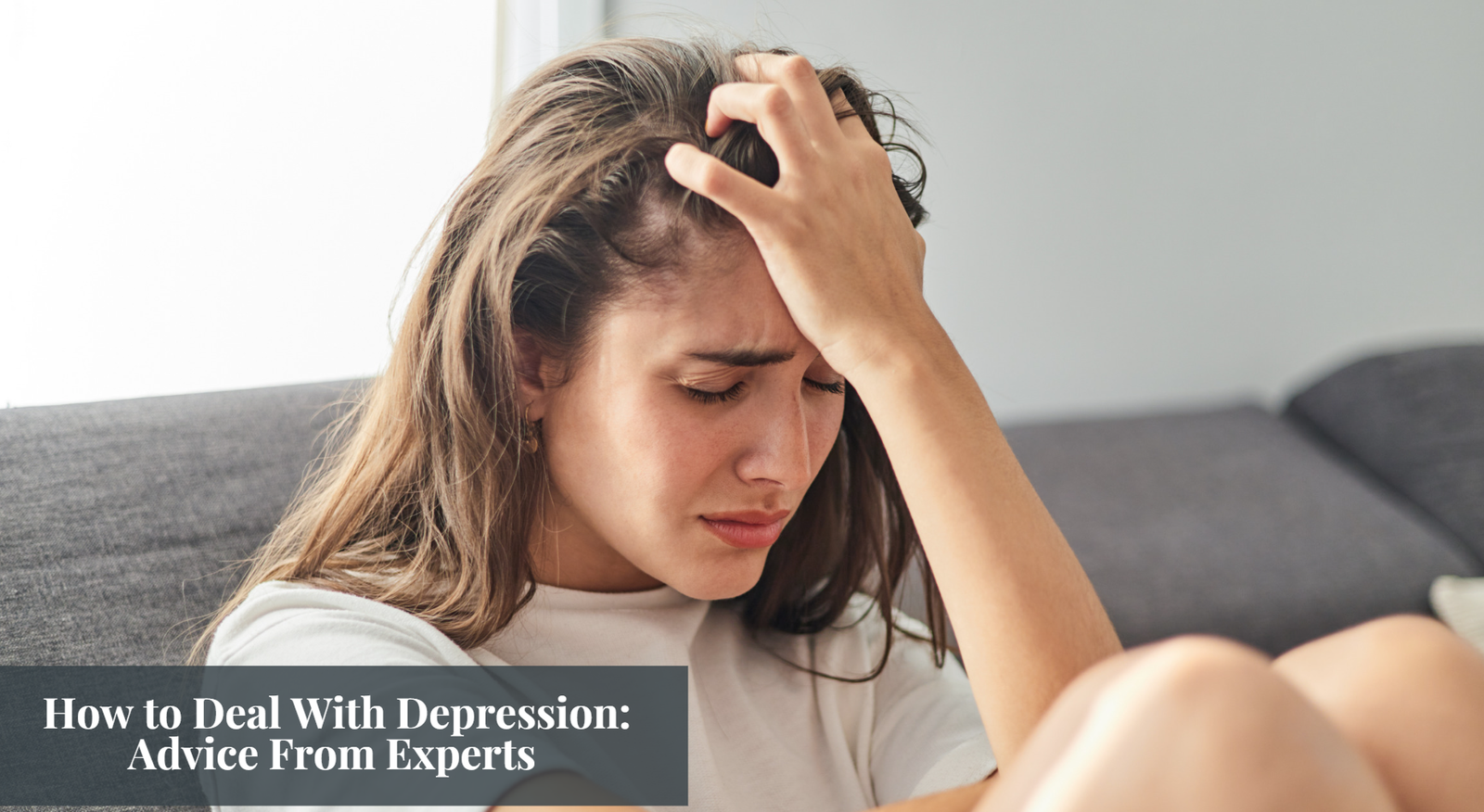Depression is like a heavy, unwavering cloud that remains in your thoughts, feelings, and energy—it’s not your normal state. A lot of people go through the experience, but it isn’t a weakness or does not get better when one thinks about it. However, you can learn to deal with it and live a better, more happy life.
Source: Canva
If you have a mental health disorder that presents with symptoms like feeling sad, empty, or having a lack of motivation, here are some tips from mental health professionals that will help you cope and take control of your mental health journey.
Understand That It’s Okay to Ask for Help
One of the most important things to remember when dealing with depression is that asking for help is not a sign of weakness, but rather the first step in treatment for depression. Many people hesitate to reach out because they fear judgment, but support can change everything.
Whether the confidant is a trusted friend, family member, or professional therapist, simply speaking about your situation can make the burden feel lighter.
Experts say that talking through your feelings is a safe way of doing this. You do not have to struggle on your own. It is perfectly acceptable to admit that you need some help. Surround yourself with supportive people who care about you and who would listen without judgment.
Make Exercise a Habit Part of Your Daily Routine
You might not feel like moving your body when you’re feeling down, but exercise is a powerful tool for lifting your mood. Physical activity releases endorphins, which are natural mood boosters that can help combat feelings of sadness or lethargy.
Don’t have to do very intense exercise and work out. Light activities such as taking a walk in the park, doing yoga, and stretching could give just as much of a payoff from 30 minutes. Identify any activity you enjoy so much doing it won’t feel so much like a chore to you. The point isn’t really about intensity but about continuity.
Eat Balanced Nutritious Meals
The food consumed determines the mental health impact that can be experienced as big. Proper nutrition empowers the body with energy to function as intended and can even put people in a good mood. For a healthy diet, experts recommend focusing on diets rich in fruits, vegetables, whole grains, lean proteins, and healthy fats.
Do not consume processed foods or higher intakes of sugar as they can cause mood swings. Opt for balanced meals that give care to your body. Hydration is crucial, too; drink enough water so you have a healthy body.
Good Sleep
Deep sleep and depression usually go hand in hand. It is quite a struggle when someone is suffering from depression, to get a good night’s rest, but without it, the feelings of sadness are so much worse. For improvement in mental health, one needs to establish a good sleep routine.
Try to follow a consistent bedtime and wake-up time. Develop a relaxing bedtime routine that might involve reading or listening to calming music. Avoid electronic devices when preparing for sleep, as they emit blue light that helps prevent people from sleeping. Seek professional help from a health professional if the problem persists.
Learn How to Identify Triggers
Depression can often be triggered or worsened by certain events, places, or situations. Triggers are things that bring up feelings of sadness, anger, or stress. Learning what these triggers are can give you the power to avoid or cope with them effectively.
For example, specific social situations, arguments with loved ones, or financial stress could be triggered. Once you notice patterns or particular situations that trigger worsening moods, you can create strategies to handle them. Coping strategies may include mindfulness, problem-solving, or learning how to set boundaries with others.
Do Things That Bring You Joy
When you’re depressed, you become disinterested in your regular interests. However, most scientists recognize that working on enjoyable activities could help someone break the cycle of depression. Some people simply enjoy listening to music, painting, gardening, or playing games, while others spend time with their pets.
Even if it doesn’t feel rewarding at first, permit yourself to try these activities. The act of doing something enjoyable can trigger positive feelings over time. Try to set aside even 30 minutes a day to focus on an activity that brings you happiness.
Connect With Others
Social connection is one of the major factors that affect mental health. Supportive friends or family members can make you comfortable during trying times. Depression can make you feel the need to isolate yourself, but reaching out to people makes you feel not so bad after all.
You can reengage with friends by just a simple text message, plan a call, or perhaps meet for coffee. Join a support group where you can express how you feel and listen to others as they share their struggles. Connection will let you feel seen, heard, and valued.
Seek Therapy or Counseling
Therapy is one of the effective ways to deal with depression. A mental health practitioner can guide you and will provide strategies that are tailored to your requirements. Therapists could help you identify thought patterns that can be contributing to your depression and teach techniques to challenge and change the patterns.
For example, CBT teaches you how your thoughts influence your feelings and actions. Therapy does not make you weak; it is a step toward taking care of your mental health. Many find therapy to be a safe space where they feel free to explore their feelings without fear of judgment.
Set Small Goals
Even the smallest of tasks becomes a mountain to climb when you are depressed. You can get motivated by setting small, achievable goals. The goals do not need to be big or complicated. Taking a shower, cleaning your room, or reading a chapter in a book is enough to make you feel accomplished.
Celebrating these small victories can indeed boost your confidence and establish momentum in you. As you work on small goals, you build motivation to achieve bigger ones over time.
Conclusion
It takes time, patience, and commitment, but this is what depression requires. This is an opportunity to realize you’re not alone millions of people have had similar experiences, and there are resources, strategies, and people who can help guide you through this journey.
Nothing is easy sometimes, but being kind and gentle to yourself in this journey makes it worthwhile. Healing begins with small steps, and every effort you make is a sign of strength.
With constant effort, a desire to try coping strategies, and the support of trusted friends, family members, or mental health professionals, you can regain control of your life and start to rediscover happiness. Some days will be harder than others, and that is perfectly fine. You don’t always progress in a straight line.
FAQs
- Is depression curable?
Depression can be effectively treated and managed but might not be “cured.” Many people report significant improvements with sustained efforts and support.
- How can I help a friend who seems depressed?
Provide support by not judging and encouraging them to seek professional help if needed. Sometimes just being there makes a big difference.
- Can one get better without therapy?
Yes. Healthy habits such as exercise, mindfulness, social connection, and having a structured daily routine will improve mood, but this is much enhanced with therapy.










